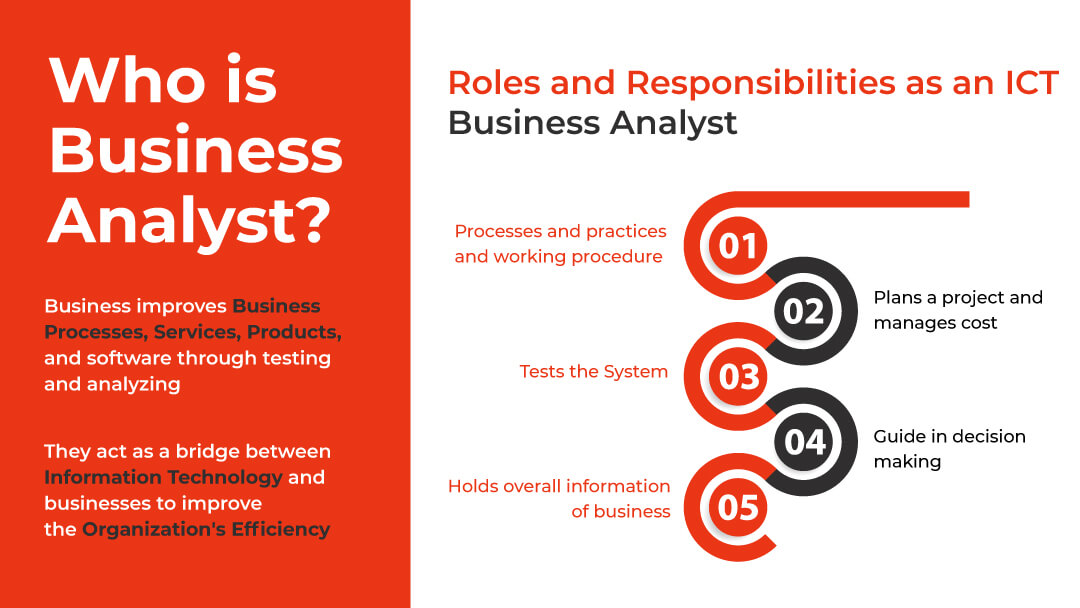
A Business Analyst is a person with various duties, including producing the requirements of a business process, mastering the needs of the business, estimating the changes needed in the business processes, and speaking regularly with the software team and the relevant stakeholders.
Business Analysts need to have some core technical and business skills while interacting with people.
Business Analyst helps businesses improve processes, services, products, and software through testing and analysis. They act as a bridge between Information Technology and businesses to improve the organization’s efficiency.
Business analysts should be familiar with both technology and business concepts. To qualify as an ICT Business Analyst, applicants must complete a skills assessment based on their educational qualifications and experience with the ACS( Australian Computer Society).
The Business Analyst is classified as job code 261111 by ANZSCO. Applicants who want to become ICT Business Analyst should provide their eligibility through RPL (Recognition of Prior Learning) with their roles and responsibilities and job descriptions as analysts.
ICT Business Analyst ANZSCO recognizes and communicates with users to create system and software requirements specifications.
Business Analyst analyzes and estimates the needs of the business or organization. They look for new designs to improve business efficiency and productivity.
To create precise system specifications for the design and development of the system software, the ICT Business Analyst uses data and process modeling.
More importantly, they act as guidance and assistance in the decision-making process.
Typically, an ICT Business Analyst works in offices or laboratories. They are given a deadline to solve specific problems. Generally, the working hour is 40 hours per week, like many other reputed office workers or professionals.
261111 ICT Business Analyst Job Description
The Business Analyst role is not limited to one task or activity; they must be able to deliver several activities that fulfill the criteria of the ACS. As a Business Analyst, you have to perform the following actions:
ICT Business Analysts are accountable for developing and implementing technology that increases the profit of an organization. Different tasks like management, analyzing business needs, quality assurance, testing, and finding valid solutions as an ICT Business Analyst.
They must have technical skills and academic qualifications that fulfill organizational needs. They must be able to use data from different surveys to develop efficient and cost-effective systems for the business.
They must have fluent communication skills, problem-solving abilities, and some Information Technology (IT) skills.
Roles and Responsibilities as an ICT Business Anayst
The various roles and responsibilities of an ICT Business Analyst have to perform are:
- As Business Analysts, they understand business processes and practices and their working procedure.
- Find out the faults and inefficiency in business.
- They are essential in planning and managing the cost and resources as they know project management principles and methods.
- Business Analyst tests the system to make sure everything is working correctly.
- They also guide the developers while developing the project and decision-making.
- They are the source of information to the developers, software, users, and stakeholders.
- They help improve the overall business by innovating new Information Technology( IT) solutions.

Here are the 4 Core Skills of an ICT Business Analyst:
Qualifications required for 261111 ICT Business Analyst
As mentioned in the ANZSCO, any desired applicants must confirm the ICT Business Analyst qualification requirement.
In the RPL report, the applicants must explain their roles and responsibilities as ICT Business Analysts. Also, they mention how your education helps you achieve goals.
Educational Requirements for ICT Business Analyst
Degree in any of the following subjects:
- Information Technology
- Computer Science
- Electrical and Communications
- Software Engineering
- Electrical Engineering
Skills requirement for 261111 ICT Business Analyst
ACS Business Analyst candidates should demonstrate intellectual, interpersonal, and technical abilities. Applicants should meet the needs and desires of the company through their abilities.
An ICT business analyst’s significant skills include leadership, problem-solving, time management, workflow management, strong communication skills, team management, and more.
As a business analyst, you need to have a wide range of skills, from communication to pretty good computer skills.
Like every other job holder, Business Analyst also gets their skills from educational certificates and Certified Business Analysis Professionals (CBAP).
1. Communication
Business analysts spend most of their time interacting with clients, management, developers, users, and others. Hence, the best communication skills are the key to having them.
The company expects you to ask the right questions, provide work in the meeting, listen to your colleagues to learn new information, and build friendly relationships with clients.
A project’s success depends on your communication ability. Hence, communication skills play a significant role.
Remember to focus on your proficiency in in-person communication, meetings, and conference calls in person and digitally.
2. Problem-Soving
Problem-solving is another must-have quality of every ICT Business Analyst.
They find a developing solution, share an understanding of solutions, have deep knowledge of the root cause of problems and the parameters of projects, and finally, find potential solutions.
Also, please share an example of your problem-solving skills in action.
Read More: Scopes of ICT professionals in Australia. 😉😉
3.Negotating
As an ICT Business Analyst, you must act as an intermediary between different personalities, like clients, developers, users, management, colleagues, and Information Technology (IT).
In the meantime, to find the best solutions and satisfy the customer, you have to think of a profitable outcome.
ICT Business Analyst help maintain a balance between mutual solutions and professional relationships.

4. Critical Thinking
Business Analysts should go through various forms of verification before making decisions. They also need to perform a critical review and think about data, documentation, workflow, and user input surveys.
To determine the best conflict resolution, a Business Analyst should ask multiple questions leading to the desired solution.
Technical skills that every Business Analyst should have are:
- Information SystemsExpert Systems
- Project Management
- Information Gathering and Definitions
- System Analysis and Testing
- ERP
- ALL
- Business Planning
- Web Engineering
- Algorithms
- Automating
- Computer Programming
- Information Technology
- Computer Science
- Software Engineering
- Artificial Intelligence
- Database Management
- Object-Oriented Design and Analysis
Certifications
Although Business Analyst is an entirely new discipline in the IT field, some organizations offer certifications to help improve your resume and establish you as a reputed Analyst.
Organizations like IIBA, IQBBA, IREB, and PMI each offer Business Analysis certifications. IREM and PMI present a certificate for business analysis. Each of them has its own certification procedure. They are:
- IIBA Entry Certificate in Business Analysis( ECBA)
- IIBA Certification of Competency in Business Analysis( CCBA)
- IIBA Certified Business Analyst Professional( CBAP)
- IIBA Agile Analysis Certification (AAC)
- IQBBA Certified Foundation Level Business Analyst (CFLBA)
- IREB Certified Profesional for Requirements Engineering (CPRE)
- PMI Professional in Business Analysis (PBA)
Learn More: Best ways to prepare a perfect RPL report for ACS Australia Immigration. ✌️✌️
Average Business Analyst
The average salary of an ICT Business Analyst is $67,762 annually, per data from PayScale. The payment varies from place to place, and the highest-paid Business Analysts are in San Francisco, while New York is the second-highest.
The different positions got different salary bases, as mentioned below in the table:
| S.N | Job Titles | Average Salary |
|---|---|---|
| 1 | Business management analyst | $60,428 |
| 2 | Business performance analyst | $60,678 |
| 3 | Business analyst II | $64,981 |
| 4 | Junior IT business analyst | $65,330 |
| 5 | Application business analyst | $66,882 |
| 6 | Business intelligence analyst | $66,791 |
| 7 | ITSM business analyst | $66,891 |
| 8 | Technical business analyst | $71,489 |
| 9 | Agile business analyst | $74,000 |
| 10 | IT business analyst | $74,000 |
| 11 | Business solutions analyst | $75,243 |
| 12 | Systems business analyst | $78,095 |
| 13 | Business analyst III | $78,107 |
| 14 | Senior IT business analyst | $90,201 |
Conclusion
Overall, ICT Business Analyst involves development like systems planning, business process re-engineering, monitoring, testing, and every other business activity.
Also, they prepare and maintain documentation, including working procedures, required costs, modifications of the systems’ additional system components, and other different components.
Every detail is expressed through documentation, guidance, and assistance in the system project. ICT Business Analyst is actively involved in decision-making and acts as a center of reference for the organization.
ICT Business Analyst plays a vital role in system analysis and design, development, integration, and system modeling.
